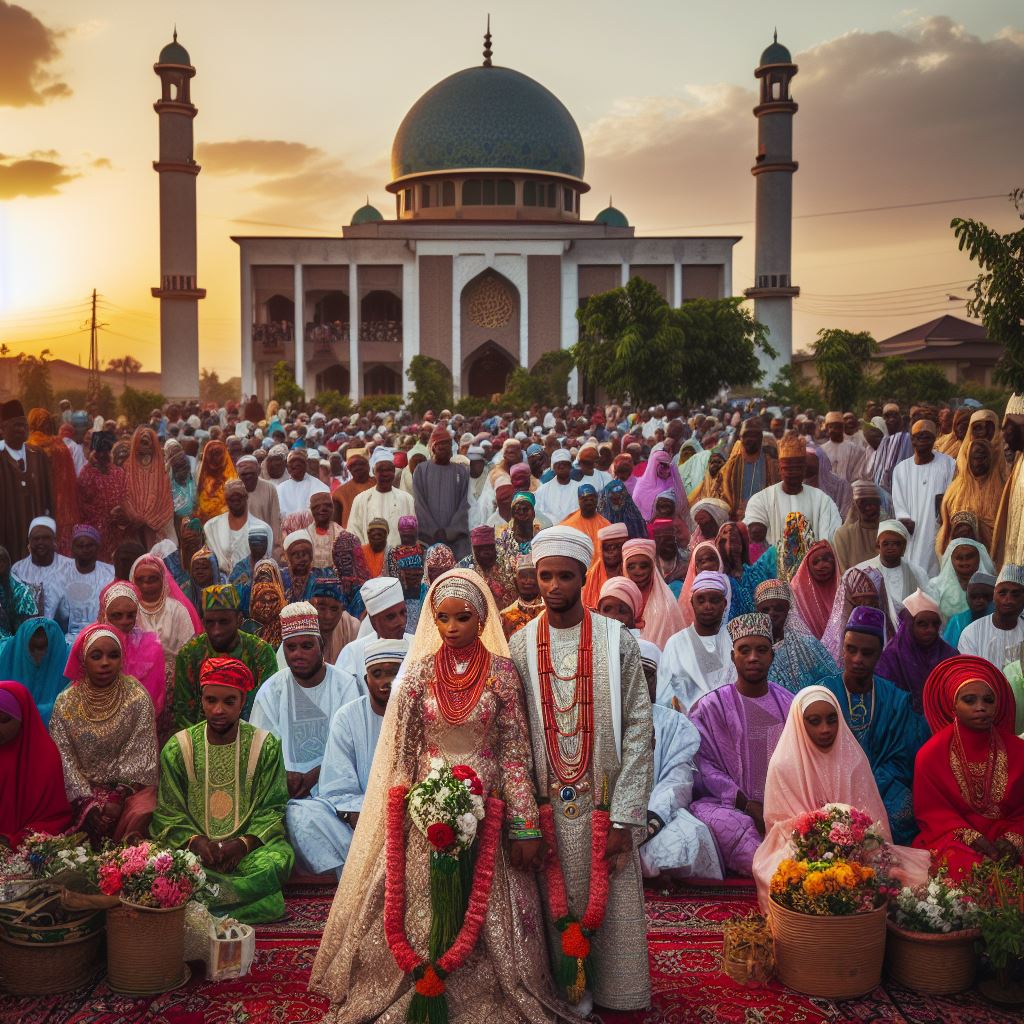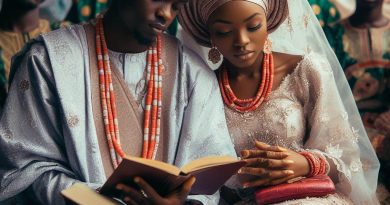Understanding Muslim Nikah: The Islamic Marriage in Nigeria
Last Updated on January 28, 2024
Introduction
Significance of Understanding Muslim Nikah in Nigeria
Muslim Nikah in Nigeria holds profound significance, representing a fusion of faith, tradition, and cultural diversity.
Purpose of the Blog Post
This blog post serves as an enlightening journey into the world of Muslim Nikah in Nigeria.
Our aim is to provide a comprehensive understanding of this Islamic marriage practice, exploring its spiritual depth, cultural nuances, and the harmonious interplay of faith and tradition.
Join us as we unravel the intricacies of Muslim Nikah in Nigeria, where love is sanctified through faith, and the union of two souls becomes a celebration of spiritual devotion and cultural richness.
This exploration is not just an informative endeavor.
It invites you to explore the core of Nigerian Islamic heritage, where matrimony intertwines with threads of faith, love, and tradition.
Overview of Islamic Marriage
Importance of marriage in Islam and its role in building a strong family foundation
Marriage holds immense significance in Islam as it plays a crucial role in establishing a strong family foundation.
It is considered a sacred and obligatory contract between a man and a woman, and is highly encouraged in Islamic teachings.
The similarities and differences between Islamic marriage and other forms of marriage in Nigeria
Islamic marriage in Nigeria shares similarities and differences with other forms of marriage in the country.
Let’s explore them
Similarities
- Consent: Just like other forms of marriage in Nigeria, Islamic marriage also requires the consent of both the bride and the groom.
- Cultural traditions: Islamic marriage in Nigeria, like other forms of marriage, incorporates cultural traditions and rituals, strengthening the bond between families.
- Legal recognition: Islamic marriages are legally recognized in Nigeria, similar to other forms of marriage in the country.
- Commitment: Islamic marriage, like other forms of marriage, signifies a commitment between partners to live together and support each other.
- Responsibilities: Both Islamic and other forms of marriage in Nigeria entail various responsibilities for the husband and wife.
Differences
- Religious ceremony: Islamic marriage involves a religious ceremony conducted by an Islamic cleric, whereas other forms of marriage may involve different religious or traditional ceremonies.
- Polygamy: Islamic marriage allows polygamy, meaning a man can marry up to four wives, while other forms of marriage in Nigeria prohibit or have restrictions on polygamous marriages.
- Marriage contract: Islamic marriage requires a specific marriage contract, known as the Nikah contract, which outlines the rights and responsibilities of both spouses.
Other forms of marriage may not have such a formal contract. - Dowry: Islamic marriage involves the payment of a dowry by the groom to the bride, while other forms of marriage in Nigeria may have different customs related to dowry or bride price.
- Divorce: Islamic marriage has its own procedures for divorce, which involve arbitration and attempts at reconciliation. Other forms of marriage may have different divorce processes.
Islamic marriage holds great importance in Islam, serving as a foundation for building a strong family.
It shares similarities with other Nigerian marriages, requiring consent and legal recognition.
However, it has distinct features, including a religious ceremony, the possibility of polygamy, a specific marriage contract, a dowry, and unique divorce procedures.
Significance of Nikah in Nigerian Muslim Culture
In Nigerian Muslim culture, Nikah holds immense cultural and social importance. It is a sacred union that symbolizes commitment, love, and the formation of a family.
Cultural and Social Importance
- In the Nigerian Muslim community, Nikah holds deep cultural and traditional significance, serving as a significant milestone.
- It serves as a way to preserve the Islamic heritage and values among Nigerians, reinforcing their identity as Muslims.
- Nikah is viewed as the foundation of a strong and stable society, promoting family cohesion and societal harmony.
- It fosters a sense of belonging and community within the Nigerian Muslim culture, as it brings families and friends together in celebration.
- The marriage contract of Nikah holds legal importance, providing rights and protection for both spouses under Islamic law.
- Nikah ceremonies are also an opportunity for the community to showcase their affluent cultural traditions through vibrant attire, music, and food.
Traditional Customs and Rituals
- The Nikah ceremony in Nigeria is a beautiful blend of Islamic customs with local cultural practices.
- Prior to the wedding, families of the couple meet to discuss and agree upon the terms of the marriage contract.
- The groom’s family presents a marriage proposal to the bride’s family, seeking their consent for the union.
- If approved, a formal engagement, known as the Kabin, takes place where gifts and dowry are exchanged between the families.
- On the wedding day, the bride is usually adorned in a stunning traditional attire, such as the Aso Oke, while the groom wears a flowing gown called Babban Riga.
- The solemnization of Nikah is conducted by an Islamic scholar, known as an Imam, who recites verses from the Quran and seeks blessings from Allah.
- After the recitation of prayers and the marriage vows, the couple is officially pronounced as husband and wife.
- A celebratory feast, known as the Walima, follows the Nikah ceremony where guests are treated to a lavish spread of delicious Nigerian cuisine.
- The bride’s departure from her family home to the groom’s residence is another significant part of the Nikah ritual.
The significance of Nikah in Nigerian Muslim culture cannot be overstated. It represents not only a spiritual union but also a celebration of tradition, family, and community.
Through this sacred ceremony, Nigerian Muslims uphold their heritage and pass down Islamic values to future generations.
Read: Love and Respect: Unearthing Biblical Verses on Marriage
Islamic Marriage Requirements
Fundamental requirements for a valid Nikah according to Islamic teachings
Islamic marriage, known as Nikah, is a sacred bond between a man and a woman, governed by Islamic teachings. To have a valid Nikah, certain fundamental requirements must be fulfilled:
- Consent: The consent of both the bride and groom is crucial for a valid Nikah. They must willingly express their acceptance of each other as spouses.
- Witnesses: The presence of witnesses is necessary to validate the marriage contract. Two adult Muslim witnesses, preferably male, should be present during the ceremony.
- Islamic Scholar (Imam): An Islamic scholar, usually an Imam, plays a significant role in the marriage process. Their presence ensures the compliance of the marriage with Islamic teachings.
Role of consent, witnesses, and the presence of an Islamic scholar (Imam) during the marriage process
The consent of both parties involved is a fundamental requirement of an Islamic marriage. It emphasizes the importance of mutual agreement and understanding between the bride and groom.
Without their consent, the Nikah would be considered invalid according to Islamic teachings.
Witnesses are essential in a Nikah ceremony to ensure the legality and authenticity of the marriage contract.
Their presence adds credibility and provides evidence that the marriage has taken place. Islamic teachings require the witnesses to be adult Muslims who can testify to the validity of the marriage.
An Islamic scholar, often an Imam, plays a vital role in the marriage process. They are knowledgeable in Islamic teachings and act as a guiding authority.
An Imam’s presence ensures the marriage aligns with Islamic principles and follows approved religious procedures.
The Islamic scholar oversees the marriage contract, ensures inclusion of essential elements, and guides the couple through the process.
They may also provide counseling and advice, making sure the couple understands their rights and responsibilities as spouses.
It is important to note that while an Islamic scholar plays a significant role, their presence does not necessarily confer the status of a legal authority.
Legally, the marriage must also comply with civil laws and regulations of the country in which it takes place.
After the Islamic marriage ceremony (Nikah), it is generally advisable to legally register the marriage according to local laws.
A valid Nikah in Islam requires the consent of both parties, the presence of witnesses, and the guidance of an Islamic scholar.
Read: Navigating the First Year: Advice for Quick Marriages in Nigeria
The Nikah Ceremony
A Nikah ceremony in Nigeria is a significant event that represents the union of two individuals in the Islamic faith. It encompasses various components and rituals that hold deep cultural and religious significance.
Let’s explore the typical structure of a Nikah ceremony in Nigeria and the rituals and recitations involved.
Structure of a Nikah Ceremony
- Pre-Nikah Formalities: Before the actual ceremony, certain formalities are observed. The families of the bride and groom meet to discuss the terms and conditions of the marriage contract.
This includes matters such as the Mahr (dowry), which is a gift given by the groom to the bride. - Welcoming of the Bridal Party: The Nikah ceremony begins with the arrival of the bridal party. The bride and groom are usually accompanied by their respective families and close friends.
- Opening Recitation: The ceremony commences with the recitation of verses from the Holy Quran. This serves as a blessing, seeking guidance and support for the couple from Allah.
- Khutbah (Sermon): A sermon is delivered by an Islamic scholar or the officiating Imam.
The Khutbah emphasizes the importance of marriage in Islam and provides guidance on the rights and responsibilities of the couple. - Consent of the Bride and Groom: Individually, the bride and groom are asked if they willingly accept each other as spouses before the ceremony proceeds.
Their verbal consent is a crucial component of the Nikah ceremony. - Marriage Contract: The bride, groom, and witnesses sign the marriage contract, known as the Nikahnama, to formalize the marriage.
It outlines the terms and conditions of the marriage, such as rights and responsibilities, and is legally binding. - Mahr Presentation: The groom presents the Mahr to the bride or her guardian as a symbol of his commitment and financial support.
This exchange signifies the groom’s responsibility to provide for his wife. - Prayers and Blessings: During the ceremony, attendees offer prayers and blessings for the couple’s future happiness, prosperity, and enduring marriage.
The Imam or religious leader leads the congregation in supplications.
Rituals, Prayers, and Recitations
- Istikhara: Prior to the Nikah ceremony, the couple may perform Istikhara, a special prayer seeking guidance from Allah to bless their union.
- Surah Fatiha: The recitation of Surah Fatiha, the first section of the Quran, is an integral part of the Nikah ceremony. It is recited to seek Allah’s blessings and protection for the couple.
- Exchange of Vows: The couple, in the presence of witnesses, expresses their commitment and love for each other through the recitation of wedding vows.
- Khutbah Tul Haja: This sermon emphasizes the importance of marriage, the significance of love, and the responsibilities of husband and wife.
- Tasbih: The ceremony often includes the recitation of tasbih, which involves the repetition of the phrase, “SubhanAllah” (Glory be to Allah). It signifies gratitude and devotion towards Allah.
- Dua: Throughout the Nikah ceremony, the couple and those present recite various prayers (duas) seeking Allah’s blessings for happiness and prosperity in their marriage.
- Exchange of Rings: In some cases, the couple may choose to exchange rings as a symbol of their love and commitment to each other.
As the Nikah ceremony concludes, it marks the beginning of a new journey for the couple. It is a celebration of love, commitment, and the merging of two families.
The rituals and prayers performed during the ceremony reflect the deep-rooted traditions and religious values cherished in Nigeria’s Islamic community.
Read: Reasons Nigerians Are Hooked on ‘Married at First Sight’ Shows

Gain More Insights: Marriage in Nigeria: Balancing Tradition and Change
Islamic Marriage Rights and Responsibilities:
In an Islamic marriage, both the husband and wife have specific rights and responsibilities. These rights and responsibilities aim to establish a balanced and harmonious relationship between spouses.
The rights and responsibilities of both the husband and wife within an Islamic marriage
Rights and Responsibilities of the Husband
- Financial Responsibility: The husband is responsible for providing financial support for the family, including housing, food, and clothing.
- Protector: The husband is responsible for protecting and providing for his wife, ensuring her safety and well-being.
- Leadership Role: The husband, as the head of the household, guides and makes decisions benefiting the family’s well-being.
- Physical Intimacy: The husband has the right to companionship and physical intimacy with his wife, as long as it is consensual and within the boundaries of Islamic teachings.
- Respect: The husband should treat his wife with respect and kindness, considering her opinions and feelings.
Rights and Responsibilities of the Wife
- Obeying the Husband: The wife is expected to obey her husband in matters consistent with Islamic teachings, ensuring harmony in the relationship.
- Household Responsibilities: The wife is responsible for managing the household, taking care of the children, and maintaining a peaceful and nurturing environment.
- Support: The wife should support her husband emotionally and be his companion, providing comfort and encouragement.
- Respect: The husband should respect his wife and value her opinions, considering them in decision-making.
- Modesty and Chastity: The wife should maintain modesty and chastity, both in her behavior and appearance, to preserve the sanctity of the marriage.
Mutual Respect, Support, and Equality
Mutual respect, support, and equality are fundamental to a successful Muslim marriage.
- Respect: Both the husband and wife should respect each other’s opinions, decisions, and personal boundaries.
They should avoid disrespectful behavior, such as belittling or insulting each other. - Support: In times of difficulty or challenges, spouses should support and encourage each other. They should be each other’s biggest cheerleaders and provide emotional, mental, and physical support.
- Equality: Islamic teachings emphasize the equality of husband and wife.
Equal rights and opportunities in the marriage are essential. - Communication: Open and effective communication is vital for the success of any marriage.
Spouses should communicate openly, honestly, and respectfully, to understand and address each other’s needs, desires, and concerns. - Shared Responsibilities: Both partners should contribute to household chores, child-rearing, and other responsibilities, based on their abilities and circumstances.
Sharing responsibilities promotes a sense of unity and cooperation.
Islamic marriage grants certain rights and responsibilities to both the husband and wife.
It emphasizes the importance of mutual respect, support, and equality, which are crucial for a harmonious and fulfilling Muslim marriage.
Understanding and adhering to these principles can foster a strong and lasting bond between spouses.
Read: Comparing Traditional Arranged Marriages & ‘Married at First Sight’
Legal Implications of Nikah
Understanding the Legal Recognition
In Nigeria, Muslim Nikah holds significant legal recognition, granting couples essential rights under Islamic law.
The Nigerian constitution safeguards rights, including inheritance, custody, and maintenance issues.
Challenges in Legal Recognition
However, there are challenges. One major issue is the recognition of polygamous marriages, which sometimes clash with Nigerian legal standards.
This dissonance raises questions about the rights and responsibilities of multiple spouses.
Calls for Legal Reforms
In recent years, there have been calls for reforms to align Nikah marriages more closely with civil law. This includes registering Nikah marriages with the government to ensure legal protection and clarity for spouses.
Unregistered Nikah Marriages
Despite these efforts, many Nikah marriages in Nigeria remain unregistered, leaving couples vulnerable in the event of disputes.
This lack of legal documentation can complicate matters, especially during divorces or inheritance disputes.
The Proposal for a Unified Marriage Law
One reform proposal is a unified marriage law, which would harmonize Islamic and civil marriage requirements, granting both equal legal status.
Such a law could help address issues related to inheritance, divorce, and spousal support, ensuring fairness in all marriages.
Muslim Nikah holds legal recognition in Nigeria, but challenges persist, particularly in the realm of polygamous marriages.
Reforms aimed at bridging the gap between Islamic and civil laws are essential to protect the rights of Muslim couples in Nigeria. Achieving equal legal standing for all marriages is a crucial goal for the country.
Conclusion
Summarizing Key Points
In summary, we’ve explored the legal recognition, challenges, and proposed reforms related to Muslim Nikah in Nigeria.
Promoting Interfaith Harmony
Understanding Muslim Nikah is pivotal for fostering interfaith harmony and embracing cultural diversity within Nigeria.
Embracing Cultural Diversity
By appreciating the significance of Nikah, Nigerians can create a more inclusive society where diverse traditions coexist peacefully.
Encouragement to Learn
To build a united Nigeria, it’s essential for everyone to delve deeper into the intricacies of Islamic marriage and its cultural importance in the country.
A Path to Harmony
Embracing diversity and understanding each other’s beliefs can pave the way for a harmonious and inclusive future for Nigeria.


